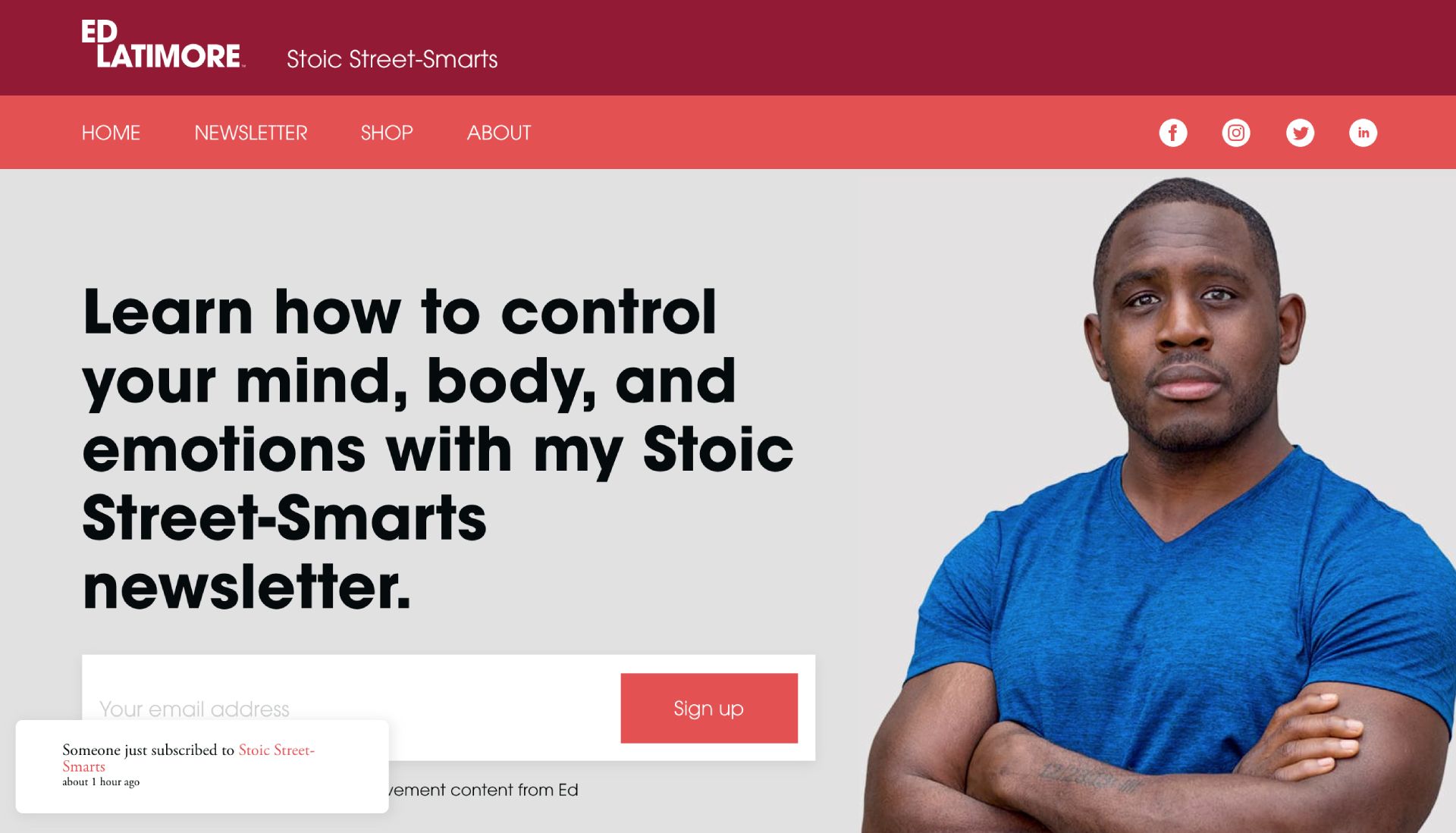Ed Latimore Shares His Best Advice
Ed Latimore teaches us how to raise ourselves up.
Not to mention, Ed is a real go-getter himself, and he's got an impressive resume to show for it.
Ed Latimore is a former professional heavyweight boxer, a recent Physics graduate of Duquesne University, a National Guard veteran, an avid chess player, public speaker, and author of three books “Not Caring What Anyone Thinks Is A Superpower: Insight From A Heavyweight Boxer”, “Sober Letters To My Drunken Self,” and “Engagement Is The New Cocaine: The Art And Science Of Writing Awesomely Addictive Tweets.”
Ed Latimore started sharing his story on his blog “Mind and Fist” in 2013, where he wrote about the tough lessons he learned from growing up in public housing projects, overcoming addictions, and self-improvement teachings.
Ed has been a guest on “The Art Of Manliness,” “Farnam Street,” “Coffee with Scott Adams,” “The James Altucher Show,” and “The Jordan Harbinger Show,” where he discussed physics, the struggle of growing up in poverty, boxing and sobriety.
Ed has been featured on Ryan Holiday’s blog “The Daily Stoic” and in James Clear’s international best-selling book “Atomic Habits.”
As if these accomplishments aren’t enough for several lifetimes already, another title Ed has earned is entrepreneur. Ed successfully sells his books, sells access to his “Stoic Street Smarts Academy” membership group, and hosts a page for his favorite products he recommends, and continues to build an inspiring personal brand on his website.
As a prolific blogger, Ed divides up all of his content into five categories, ‘Mental Mastery,’ ‘Physical Mastery,’ ‘Emotional Mastery,’ ‘Money Skills’, and ‘Addiction & Sobriety.’ He brings a raw and genuine fresh take on these popular self-improvement topics.
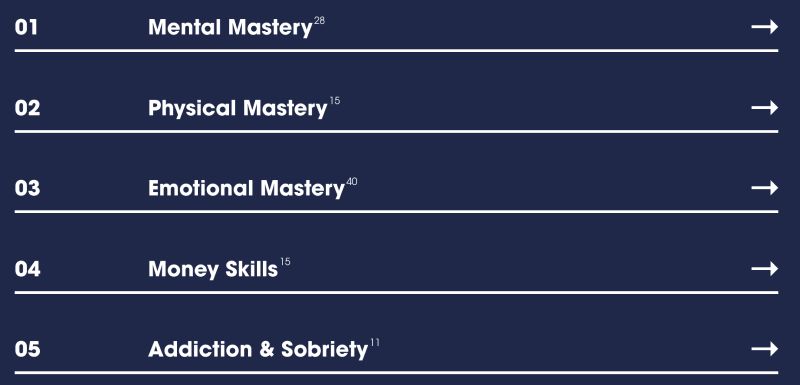
Ed uses Fomo to display on his website in real-time when someone joins his newsletter, his membership program, or buys a product. A few of the integrations he’s connected with Fomo are Active Visitors, ConvertKit, and Gumroad.

In the world of those who talk openly about their self-improvement journey, Ed is one of the more well-known and vulnerable figures.
That’s a quick intro for those of you who haven’t heard of Ed already.
Now let’s get to know Ed more personally.
You pursued totally different fields - across boxing, chess, physics, and entrepreneurship - and achieved high success at each: what habits did you develop that helped you excel each time you started down a new trajectory?
“The most important habit is consistency. The most important mindset is patience. The most important thing I did—and continue to do—is develop a working application of these two ideas in the form of the belief, “Given enough time, I can learn anything.” I just figure that if I keep plugging away, practicing diligently, and learning from my mistakes, I’ll eventually be proficient in whatever I choose to be.”
Across all of your achievements, what are you most proud of and why?
“Though it is not a skill, per se, I am most proud of my continued sobriety and the book that I’ve written to help people along a similar path. I’m most proud of this because I believe that my life is what it is today because of my sobriety. If I didn’t get that under control, I wouldn’t have anything else. So the book I wrote about sobriety—Sober Letters To My Drunken Self—is the most important thing I’ve done. I can give people a chance to get their lives back on track as well.”
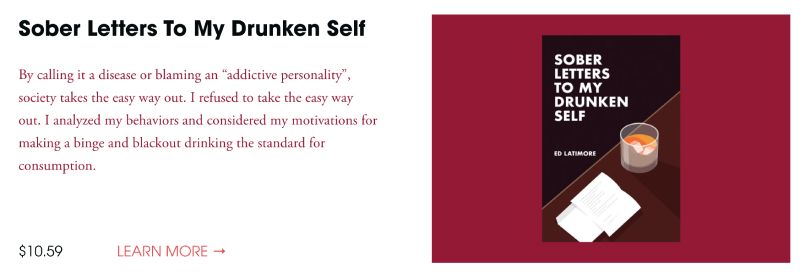
You frequently talk about the importance of self-discipline. What does self-discipline look like for you in your online entrepreneurship career?
“As an entrepreneur, you’re a lot like a shark: the moment you stop moving, you start dying. Of course, the goal isn’t just to be busy but productive. This life comes with a lot of freedom, but with that comes a lot of responsibility. I know that if I stop producing, growing, and developing, then I run the risk of becoming stagnant. And in entrepreneurship, stagnation is death. So because I don’t want to lose this freedom, I make sure that I do the work that I need to do every day.”
“I am disciplined, but I can’t lie: fear of being ordinary and returning to the constraints of an average life drive me at least as much as my desire for more. So in this way, I have something to run towards and something to run away from. A very effective combination.”
You reached a high level of success in many different territories. Why do you think you’ve been able to switch gears and climb different mountains so fluidly?
“This may sound counterintuitive, but I’ve been able to switch because they’re all so different. For example, when I was in school, it was easy for me to study physics for hours after physical training because it was so different. I could produce content for my blog and newsletter because it was so different from solving math problems. My skill set is designed to provide a respite from other skills. This is probably why I have so much energy to pursue my goals in these different areas.”

Your personal brand revolves around self-improvement and encouraging others to reach their potential: what are three tips you’d prioritize giving someone for their journey?
“Have something you’re afraid of. This is what you’re running from. This is what you don’t want to be. This is the terror to keep you moving forward.”
“Have something you want or want to be. You need something to keep you going. A dream. Something to visualize. Yes, you can make a lot of progress via negativa, but it’s a lot easier when you have something that you’re trying to accomplish as well.”
“Don’t be afraid.”
“Don’t be afraid to let go of the past.”
“Don’t be afraid to leave friends behind.”
“Don’t be afraid to suffer and experience pain.”
“Don’t be afraid to take risks on something that isn’t guaranteed.”
“Don’t be afraid to leave the old you behind to become someone better.”
Tell us about your current business. When did you launch, where are you headquartered, what moved you to start your business?
“My business is simply my website and the products I create around the writing and self-improvement space. I originally started as just a blogger and writer but quickly realized that I could monetize my knowledge and experiences to help people. With my reach and quality of my content, it’s been a great time growing and developing my website, content, and products.”
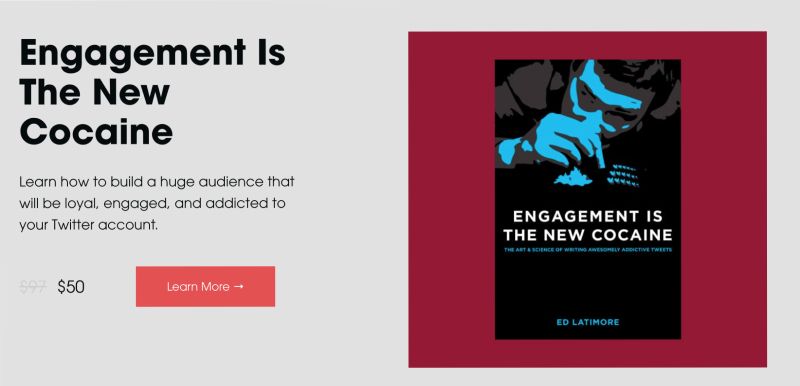
You are really active on social media and have a big following. What advice do you have for a business that is considering opening their social media accounts with no personal brand or fans to start with?
“Connect with others and add value to the conversation.”
What do you feel Fomo is doing for your business?
“Fomo is doing an incredible job getting people to check out products while they’re on my site that they would have otherwise missed. Very often, when people land on my website, it’s from a specific piece of content, and they aren’t necessarily looking to buy anything. However, Fomo lets people see that things are selling, and so it piques their curiosity, and they check out my products. Before, I don’t think there was a lot of awareness of how many things my site had to offer.”
What are a couple of specific conversion-related problems you’re experiencing? What other strategies did you try in order to address those issues before using Fomo?
“I’d like to get my conversion percentage a little higher. I drive a decent amount of traffic through to my offers, but I’d like to see a conversion higher than 5%. I think I average maybe 3% from non SEO traffic.”
“I simply tweaked my copy and changed my offer around a few times. I hadn’t used any specific apps or services to help me fix this issue.”
How did you learn about Fomo?
“I’d seen it on a few websites, and I was interested in seeing the results it could have on mine.”
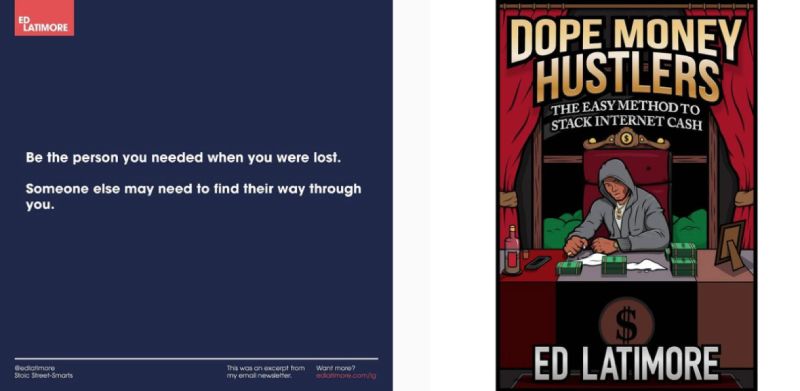
What prompted you to move forward with Fomo?
“A friend told me about some of the numbers he had using the service (or something similar). It seemed like a natural fit for me given how much varied and interesting content that I have.”
Can you share some of the ROI results of using Fomo on your business?
“The conversion rate for people who come to my website directly is up to 20.6%. This is up from a range of 11-15%. Fomo has allowed my website to truly become a passive income vehicle. I’m converting more traffic from people who weren’t necessarily searching for my products but instead were just interested in my writing.”
In your 'How To Make Money Online For Beginners' article, you talk about being a walking billboard for your own product/service. Are there other strategies you use to convert a sale?
“I rely heavily on social media. My Twitter, Instagram, and Facebook are big channels of conversion for me. I also make heavy use of my email list.”
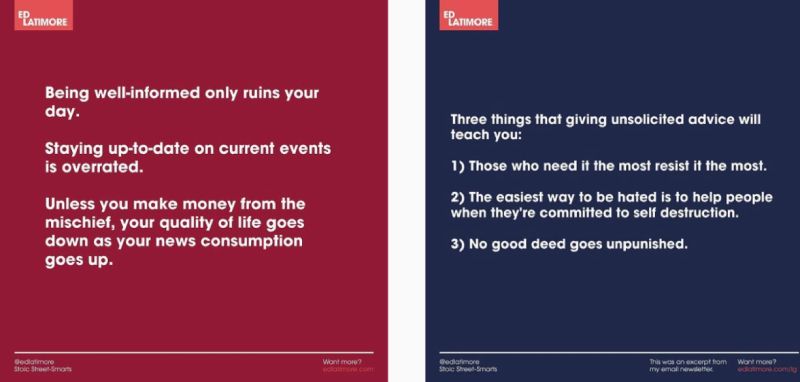
What products do you recommend for a website’s conversion funnel stack?
“I’m very basic in my tools. I simply try to rely on good copy and artwork to make conversions.”
Do you have any changes you’d like to see made with Fomo? Any ideas for the team?
“Right now, I really like everything you guys are doing. I have no ideas or complaints, but if I think of something, I’ll make sure I pass it along.”
Do you have any advice for other Fomo users?
“Make sure you have a diverse range of products and a reason for people to visit your site other than to buy. This is huge in really getting the most out of Fomo. People may not notice when you have something for sale if they’re just browsing your site because of the SEO content that brought them there, but if Fomo is working in the background, then you can really capture a few extra sales—or more, depending on your niche and level of traffic.”

Do you use social proof for marketing in your online business?
“Not particularly (aside from Fomo). I just try to create decent content. When I get a great testimonial, I’m not shy about using it, but that’s about it.”
You talk about marketing as communicating what you bring to the table. How do you stand out and get people to pay attention to what you have to say?
“Clear communication and a transparent life that makes it clear that I practice what I preach, and I live a life that you can learn something from.”
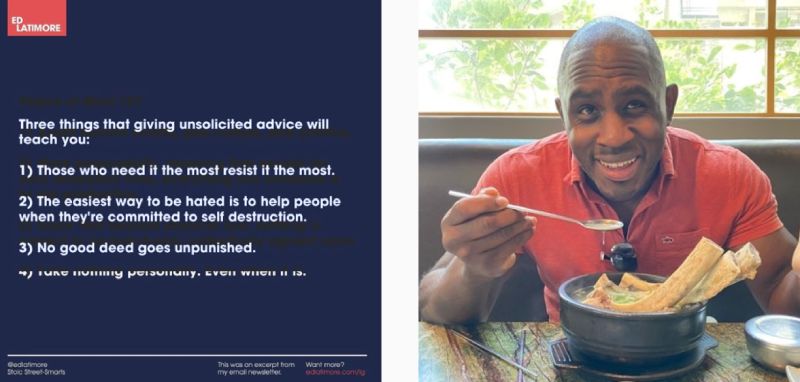
What’s next for you? What projects are you working on?
“I’m launching a series of membership sites over the rest of the year and also finishing my next book, which is a practical, non-religious guide to forgiveness.”
What is one thing you want customers to take away from your business?
“If you’re willing to do the work, you can dramatically improve your life. No matter where you start, you have a chance to finish the race in a decent position and really ride the ride.”
A tremendous thank you to Ed for sharing his story on the Fomo blog. If you’re looking for inspiration and encouragement to make changes in your life, be sure to give his website a visit.
If you’re curious about what Fomo can do for your business, give our 14-day free trial a go here.
